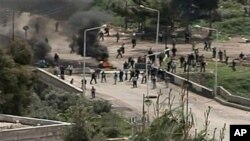Syrian security forces and pro-government gunmen killed four protesters and wounded dozens Sunday after the army had sealed off large sections of the coastal city of Banias following anti-government protests there.
Witnesses say hundreds of demonstrators had gathered near the al-Rahman mosque, a focal-point of opposition protests. Their accounts could not be independently confirmed as the government has placed severe restrictions on news coverage and many journalists have been ordered to leave the country.
The government blames the violence on armed gangs and has vowed to crush further unrest. State-run media reported that a Syrian security officer was killed and other troops wounded when their patrol was ambushed near Banias in apparent retaliation.
Earlier in the day, witnesses say government loyalists from Syria's ruling Alawite minority had fired from cars at a group of people guarding a Sunni mosque in Banias, wounding five.
Anti-government protests erupted in Syria more than three weeks ago and have been spreading, with demonstrators calling for sweeping political reforms. President Bashar al-Assad has responded with both force and limited concessions that have failed to satisfy demands for an overhaul of Syrian institutions.
State media quoted Mr. Assad on Sunday as saying the country is on the road to comprehensive reforms.
But the Syrian leader has not addressed a key demand of protesters - ending Syria's decades-old emergency law that gives the government a free hand to stamp out public protests, ban opposition and justify arbitrary arrests.
Mr. Assad, a member of the Alawite sect that comprises 10 percent of Syria's population, has used the secret police, special police units, irregular loyalist forces and regular army units to counter the grassroots revolt.
Witnesses say security forces used live ammunition and tear gas to scatter thousands of mourners in Daraa Saturday, after a mass funeral for 26 protesters killed in and around the city the day before.
After Friday's bloodshed, Syria's Interior Ministry said there is "no more room for leniency or tolerance" in enforcing the country's laws and maintaining security.
Four Protesters Killed in Syrian City




